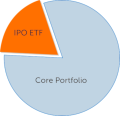A total of seven companies came to market this week, the highest weekly number in roughly three months. However, all seven deals priced below the midpoints of their proposed ranges and trading was lackluster, indicating the IPO market remains shaky after months of broader market volatility.
Leading semiconductor company NXP (NXPI) priced its 34 million shares at $14, below the $18-$21 range. With $475 million in gross proceeds, the KKR and Bain-sponsored deal was the fourth largest IPO year-to-date. The former carve-out of Philips fell roughly -2% in its early trading on Friday, which was not surprising given its highly leveraged balance sheet and the lackluster trading by other PE-backed deals.
Trius Therapeutics, which is developing a Staph infection antibiotic, (TSRX) started the week with its $50 million offering on Monday. The biotech was forced to slash its IPO price to $5 from its original range of $12-$14 and offered 10 million shares; its stock has seen low volume and flat trading since its listing on the NASDAQ. Pricing pressure was expected given the disappointing performance of early stage health care companies that have braved the IPO market in previous months. NuPathe (PATH), another biotech lacking commercial products and seeking approval for its migraine treatment "Zelrix," also raised $50 million in its IPO by offering 5 million shares at $10, down from its proposed $14-$16 range. D. Medical (DMED), an Israel-based insulin pump provider, was the smallest IPO of the health care-related group: it generated $11 million by offering 1.5 million shares at $7, at the low end of its range, which was downwardly revised to $7-$9 from $10-$12.
The biotechs were joined by others including a China-based education services provider, a Midwestern apparel retailer, and a secure online document management firm. Ambow Education (AMBO), which provides test prep and IT training in China, has benefited from a rapidly growing domestic education services market. The company raised $107 million by offering 10.7 million ADSs at the low end of its $10-$12 range and saw its stock fall 8% in its debut; the company's mainly acquisition-driven growth and capital-intensive expansion plans may have been turn-offs for IPO investors.
Gordmans Stores (GMAN), an everyday low-price retailer with 68 locations in the Midwest, offered 5.4 million shares at $11, over 20% below the midpoint of its $13-$15 range. Despite a solid track record and an attractive valuation, Gordmans saw its stock remain flat in its first day of trading and drop -2% in the aftermarket, implying investors were not sold on its planned accelerated growth strategy. Intralinks (IL), which offers products and services that allow for the safe exchange and organization of critical information, raised $143 million and traded flat in its debut.
Despite the uninspiring performance of this week's diverse crop of IPOs, healthy volume and a building IPO backlog (currently worth $40 billion) are positive signals for the IPO market. Filing activity has remained steady with 20 initial submissions last month.


